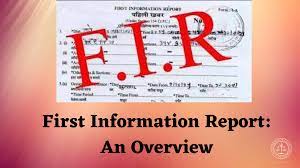FIRST INFORMATION REPORT (FIR).
MEANING:
First information report is recorded under section 154(1) of code of criminal procedure , whenever information regarding commission of an cognizable offence (offences which are serious in nature) is given by the victim or any other person to the police officer he shall reduced it to writing must be signed by the informant refusal to sign by the informant is punishable under sec 180 IPC, and the copy of the report shall be provided to the informant free of cost. It was held in Lalita kumari vs Government Of U.P.& Ors (12th November 2013) that if the information given clearly mentions the commission of a cognizable offence, there is no other option but to register an FIR by the police officer.
WHERE TO REGISTER AN FIR ?
FIR can be filed in police station of the concerned area in whose jurisdiction the offence has been committed or police station in other areas where the police officer shall register it as ZERO FIR and therefore transfer over to another police station in whose jurisdiction of that area the offence has been committed.
TIME LIMIT TO FILE AN FIR?
FIR should be filed promptly without wasting any time but if there is delay in filing an FIR it must be backed by a valid reason like in the case of Raghbir singh vs The state of Harayana (31st march 1980) it was held going to hospital due to the condition of the victim for saving his life first was a reasonable ground for delay in filing of an FIR, also in the Harpal singh vs state of Himachal pradesh (14thnovember 1980) there was a delay of 10 days lodging of an FIR but reasonable explanation was given as it was a rape case and honour of family was involved they needed time to decide whether to take the matter to court or not .
WHAT ARE THE REMEDIES AVAILABLE IF POLICE OFFICER REFUSE TO REGISTER AN FIR?
Firstly as mentioned under sec 154(3) may send in writing of such information and by post, to the superintendent of police who if satisfied of cognizable offence shall either investigate himself or direct an investigation to be made by any police officer subordinate to him .
secondly if the remedy under section 154(3) doesn’t proves to be effective then the informant may file a complaint before the judicial magistrate under section 153(3) r/w section 190 of the criminal procedure code which gives power to the magistrate to take cognizance of the case and direct police to investigate the case .
After all the above mentioned remedies informant may opt for writ petition in respective high court for the issuing of writ mandamus against the police officer and would direct them to answer to the court reasons for not lodging an FIR .
In the case of sakiri vasu vs state of U.P. & Ors. (7th December 2007) If a person has a grievance that his FIR has not been registered by the police station his first remedy is to approach the Superintendent of Police under Section 154(3) Cr.P.C. or other police officer referred to in Section 36 Cr.P.C. If despite approaching the Superintendent of Police or the officer referred to in Section 36 his grievance still persists, then he can approach a Magistrate under Section 156(3) Cr.P.C. instead of rushing to the High Court by way of a writ petition or a petition under Section 482 Cr.P.C. Moreover he has a further remedy of filing a criminal complaint under Section 200 Cr.P.C.
QUASHING OF FIR WHEN FIRST INFORMATION REPORT IS FALSE.
FIR can be quashed by the high court if the court finds out that the accused is a innocent person and is falsely implicated; under article 226 held in kapil Agarwal vs. Sanjay Sharma ( 1st march 2021) and inherent power under sec 482 to prevent abuse of law.
In Parbat bhai Aahir vs state of Gujarat(4th October 2017) following important guideline for quashing are as follows:
1.Section 482 preserves the inherent powers of the High Court to prevent an abuse of the process of any court or to secure the ends of justice. The provision does not confer new powers. It only recognizes and preserves powers which inhere in the High Court;
2. The invocation of the jurisdiction of the High Court to quash a First Information Report or a criminal proceeding on the ground that a settlement has been arrived at between the offender and the victim ultimately on the facts and circumstances of each case and no exhaustive elaboration of principles can be formulated . The power to quash under Section 482 is attracted even if the offence is non-compoundable.
3. In forming an opinion whether a criminal proceeding or complaint should be quashed in exercise of its jurisdiction under Section 482, the High Court must evaluate whether the ends of justice would justify the exercise of the inherent power.
CONCLUSION
FIR is the first step to initiate a criminal proceeding against the accused who has committed a criminal offence by informing the police about the crime committed and any other evidences so that the accused could be convicted for the crime committed but when there is a false first information report it should be quashed in order to prevent abuse of the law .




Leave a Reply
Want to join the discussion?Feel free to contribute!